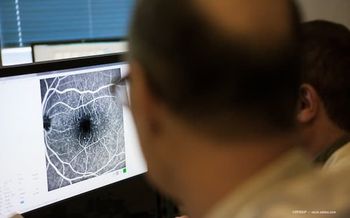
Study determines female ophthalmology students were less likely to ask questions during grand rounds
The main finding was that the male grand round attendees were more likely to pose 1 of the first 3 questions compared with female attendees.
A prospective cohort study led by Lauren Hennein, MD, found that male attendees were more likely to ask questions during virtual ophthalmology grand rounds compared with female attendees at an academic medical center.1 Hennein is from the Viterbi Family Department of Ophthalmology, University of California, San Diego, and the Department of Ophthalmology, Rady Children’s Hospital—San Diego.
The goal of this study was to determine if female attendees at the ophthalmology virtual grand rounds were less likely to ask the grand rounds speaker questions compared with their male counterparts.
Attendees of grand rounds at the Department of Ophthalmology at the University of California, San Francisco, from April 2020 to April 2021 participated in this study. All grand rounds sessions, Hennein explained, were held via a synchronous live video communication platform, during which a predesignated attendee collected the sex of all attendees, the sex of the grand rounds speaker, and the sex of each individual who asked a question of the grand rounds speaker in the order of inquiry. The speakers and audience were unaware of the study.
The main outcome measure was the association between being female and asking 1 of the first 3 questions.
The investigators observed 31 virtual ophthalmology grand rounds sessions. The sex of the grand rounds speaker was female in 13 of 31 sessions (42%); the mean percentage of the audience sex at each of the grand rounds sessions was 47% female, 45% male, and 8% unknown.
The main finding was that the male attendees were more likely to pose 1 of the first 3 questions compared with female attendees (prevalence ratio, 3.1; 95% confidence interval, 2.1-4.5; P < .001), Hennein reported.
In commenting on their findings, the authors said, “Sex disparities exist in academia. Female attendees consistently ask fewer questions in scientific meetings than male attendees, even when they constitute half of the audience.”
The investigators concluded, “The male attendees were more likely to ask questions during virtual ophthalmology grand rounds compared with female attendees at an academic medical center. Strategies to encourage equal participation of sex in academic discourse should be encouraged.”
Reference:
Hennein L, Liu Y, Shuman EA, et al. Role of sex in participation during virtual grand rounds in ophthalmology. JAMA Ophthalmol. Published online July 20, 2023; doi:10.1001/jamaophthalmol.2023.3010
Newsletter
Keep your retina practice on the forefront—subscribe for expert analysis and emerging trends in retinal disease management.



























